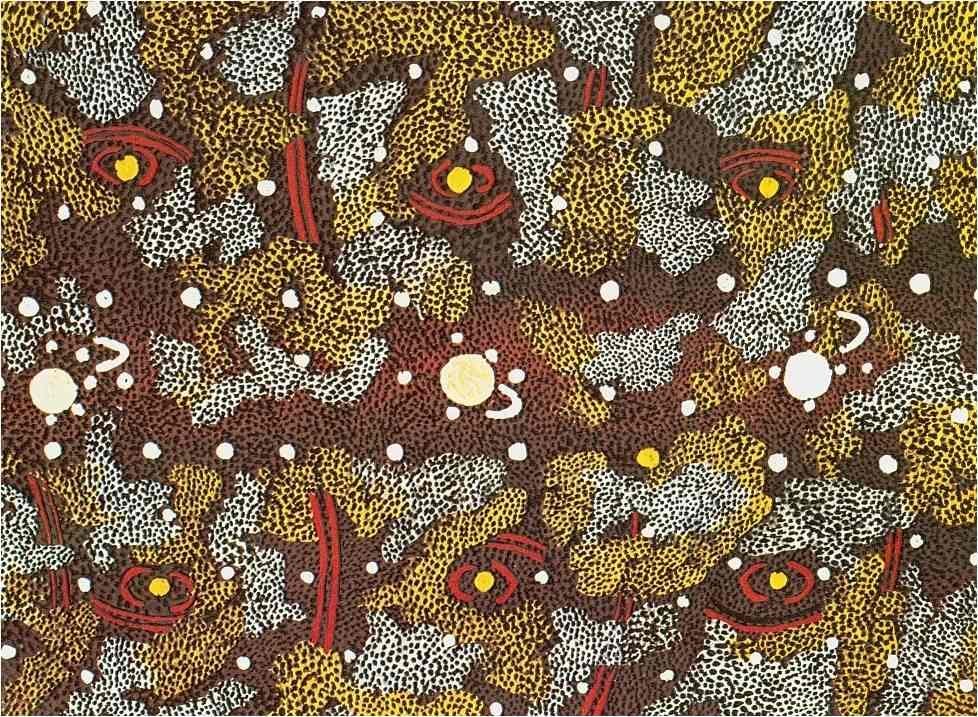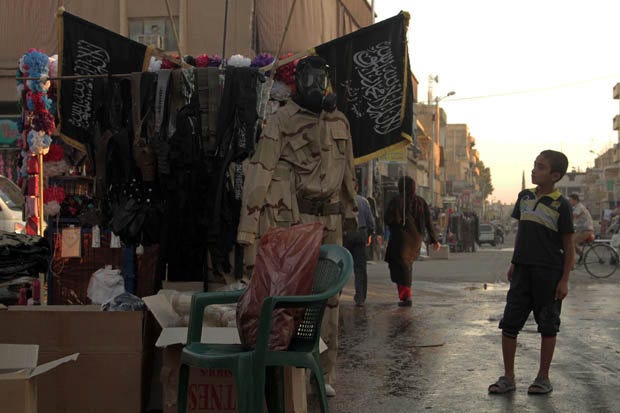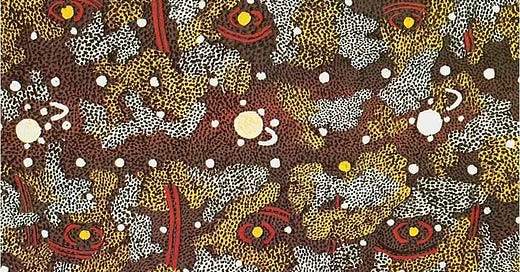
Fig. 6: Tim Leura Tjapaltjarri, Sun, Moon and Morning Star Tjukurrpa, 1973, synthetic polymer paint on wood, 45 x 58 cm, printed in: Bardon, Geoffrey: Papunya Tula. Art of the Western Desert, McPhee Gribble, Melbourne 1991, p. 121
A failing prime minister reached for terror.
The airport queues led out the door, as extra screening was introduced. Hundreds of thousands of travellers severely inconvenienced.
Cleveland Street was blocked off, causing massive traffic jams.
They could manage a full on drug raid in the middle of the night with almost no one but a few ice addicts from the housing estates watching on; and the observers would assume, as they watched the ram raiders and the tactical response outfits, that they were simply hallucinating.
But discretion was not the order of the day.
Of course not.
The whole world had to know.
A government in profound crisis was reaching for anything that remained in the tool box.
And, of course, there was always fear. In the grime at the bottom of their kit lay terror.
The Prime Minister's master drum beat, News Limited, trumpeted terror across page after page, headline after headline.
But not even they could save him.
It could all have been done discretely, with order, discretion, assurance, confidence.
It was not done at all, or done badly. Splashily. For maximum propaganda impact.
The problem was, the purveyors did not understand the art of messaging, and had no understanding of their target audience.
You could not in one breath tell the public that they were living in "the most successful multicultural society on Earth" and in the next beat the drums of war against the Muslim minority.
All it did was create a kind of statewide, nationwide, cognitive dissonance. A profound disconnect.
So the workers who had been entirely left out of the national debate poured their scorn and ignored the ministrations of the overlords, the lies which were now the public narrative.
For everything they did was against the precepts of the cultural Marxism, political correctness, which held sway across the institutions and across the government,
They smoked. They drank. They made ribald jokes. They weren't all that monogamous all that often. They thought the country was a joke and told you so, if they thought about such things at all, anymore.
Yes, in times of crisis populations turn to governments to protect them; but this was a crisis of such long standing, with so many contradictions, the public discourse had so totally ignored them for so very long, or been entirely antipathetic to their interests, that instead they turned inward or switched off.
They certainly didn't clutch Mommy Dearest.
Understanding the enemy, as the people had become, was the first order of war.
Truth The First Casualty.
But inept, creaking, internally riven political machinery simply fell towards a disaster line, a collapsing scaffolding against a stained sky.
Nothing, absolutely nothing, in the entire country worked properly.
Step by terrible step, the totalitarian state.
Something wicked this way comes.
But he digressed.
The Watchers on the Watch would spin it for their masters.
One of the most puritanical and condescending idiots, yet one more nemesis in the public service, had been kicked up stairs.
Those who were designated to serve had become the enemy of the people.
The Enemy Within.
"I could put a bullet through his brain," a bored former soldier offered one recent night.
"Don't you dare touch a hair on his head," came the response.
The dreaming spires of yore, where Bertrand had been such a celebrity, were now the dreaming suburbs of the antipodeans. He couldn't believe what he saw.
Drifts of paranoia, dementia. The City At The End of Time. An entirely devolved society, where overweight women with the mental age of a nine-year-old queued at checkouts in their frumpy outfits, thinking of little.
Certainly not of Michelangelo.
Nearby, a woman had just been diagnosed with ovarian cancer.
The policeman dreamed. Railings. Images of courtrooms and cells. Someone was due to face court today, deemed fit to stand trial.
Incessant. Proud of his job. Loved the drama. The guns. The sense of civic duty. He looked cute in his pressed uniform. For his mom.
Assault with a deadly weapon. Take him down the station.
Fingers reaching for the dial. Amplification.
A failing political system.
The rivers were running every which way, darting electric worms, filaments of neural networks sliding through the divides.
Assurance. I assure you.
Hold forth. Hold on.
Day by terrible day.
THE BIGGER STORY:

As what remains of Islamic State crumbles, the would-be victors have started circling. In Mosul, Iraqi forces have begun preparing for peace in the city where the now-encircled marauders took root three years ago. Across the border in Raqqa, with five of its neighbourhoods under their control, Kurdish forces are contemplating what comes next for them and their cause.
Analysis Ever-closer ties between US and Kurds stoke Turkish border tensions
Following Turkish airstrikes last week, US armoured vehicles have been deployed as a buffer between Kurdish and Turkish forces
Day-after scenarios are rapidly being plotted by every group that has played a role in Iraq and Syria over many years of war and loss. Russia, the US and Iran are jostling for advantage across the swath of both countries held by the capitulating group. The prize is far more than who gets to claim the inevitable military victory over Isis. At stake, for all sides, is the future make-up of the region and a chance to shape it in their likeness.
The wish list of outcomes is broad and divergent. For Russia, there is the chance to establish a presence in the centre of the region, with political muscle and enhanced gas and oil interests. For Iran, a consolidated and potentially decisive role in both countries. And for the US – in the absence of a broader strategy – the chance to spoil its rivals’ plans.
Amid the great power struggles, others too have sensed opportunity in chaos. The Kurds of Iraq and Syria have made little attempt to hide the fact that the post-Isis vacuum marks a rare, potentially historic, moment.

A security and terrorism expert says increased passenger screening at Australian airports in the wake of the weekend's alleged bomb plot arrests is just "window dressing".
Extra security measures are in place at airports across the country after four men who were allegedly plotting to blow up a plane with an improvised explosive device made out of a meat grinder were arrested in anti-terror raids across Sydney on Saturday.
But Roger Henning, the chief executive of Homeland Security Asia/Pacific, says airport security scanners do not pick up every threat.
"The plot that has unravelled in the last couple of days, probably would've been stopped if they were using a metal kitchen object as part of their [explosive device]," he told RN Breakfast.
"But there are other ways of blowing up aeroplanes and they're certainly not covered by anything the Australian Government or agencies have done to date.
"There is no scanner that can pick up plastic explosives."



